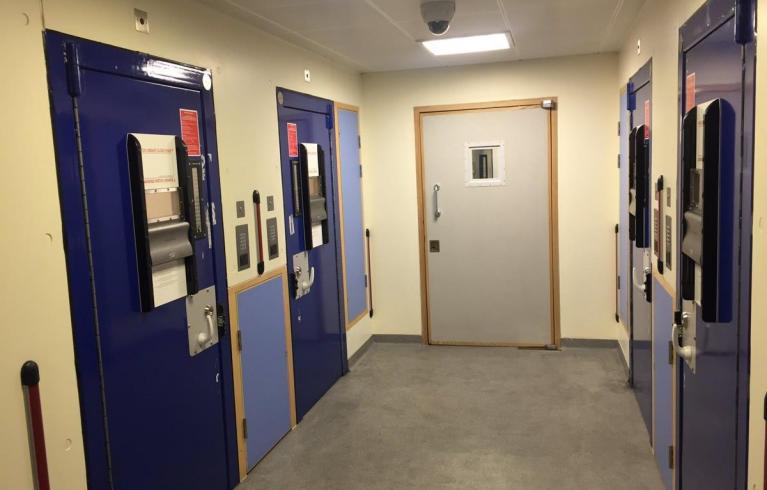
Key information
Publication type: General
Publication date:
Contents
Key facts
- Between January 2017 and January 2018, 1,295 children aged under 18 were charged and detained in police custody by the Met.
- Overall, the number of people being taken into police custody has fallen in recent years. In 2017-18, around 161,000 people were detained in custody four years ago it was almost 250,000 a year.
- Despite the overall fall in these numbers the proportion of detainees requiring health assessments is up from 36 % 2015/16 to 45% (72,000) in 2017/18.
- In 2017-18 nearly 5,400 ambulance calls were made from Met custody suites, a slight decrease on the previous year but a 15 per cent increase on 2014-15.
Key findings
- The number of people being taken into police custody has fallen in recent years. In 2017-18, around 161,000 people were detained in custody. When we last investigated this issue the number stood at nearly 250,000 a year.
- But the demand for healthcare services in custody is not falling in line with this reduction. In fact, the proportion of detainees being examined by a healthcare professional is increasing.
- Progress has been made in the recruitment of healthcare professionals in custody suites. But even with a smaller number of custody suites to cover, many are still stretched.
- A lack of secure accommodation for children in London often means there is no option but to keep a child in a police cell, sometimes for periods overnight.
- Vulnerable adults held in custody - including, for example, those with mental health problems - could be left at risk because no-one has responsibility to provide them with an Appropriate Adult or advocate.
Key recommendations
- Mayor’s Office for Policing and Crime (MOPAC) should, as part of its review of custody healthcare arrangements, carries out a robust assessment of the need for secure and non-secure accommodation for detained children and young people across London.
- By the end of 2018, MOPAC and London Councils develop a plan for improvement towards reducing the number of children kept in custody.
- MOPAC should conduct an urgent feasibility study for a London-wide Appropriate Adults scheme, like the one it runs for Independent Custody Visitors. In the meantime, MOPAC should increase awareness among the public of the opportunities to volunteer as Appropriate Adults.
Next Steps
The Deputy Mayor for Policing and Crime have both responded to the recommendations in the report:
- The Deputy Mayor’s response stated that work was underway with the Met and London Councils to ‘develop our shared understanding’ of the need for secure and non-secure beds for children in London police custody so that better provision can be developed. The Deputy Mayor will report back by the end of 2018.
- The Met said that it was working with London Councils to develop a pan-London agreement on the overnight detention of children in custody and their transfer to alternative accommodation.
- With regards to Appropriate Adults, the Met and NHS were each contributing £240k to support council-funded Appropriate Adult provision for adults. The Deputy Mayor would report back on the implementation of the partnership protocol bringing together the Met, NHS, and London Safeguarding Boards. The Deputy Mayor was happy to promote volunteering but noted that some boroughs deploy sessionals, meaning that infrastructure for volunteering is limited.
The committee will continue to monitor the Met’s custody arrangements as they develop.
Follow us @LondonAssembly and tweet us about the report using #AssemblyPolice and #Custody
Back to table of contents
Related documents
Final Healthcare in custody report
Deputy mayor response to report
Met Police response to report